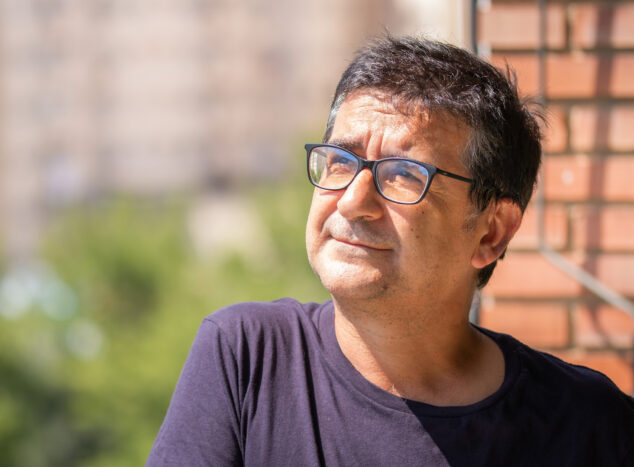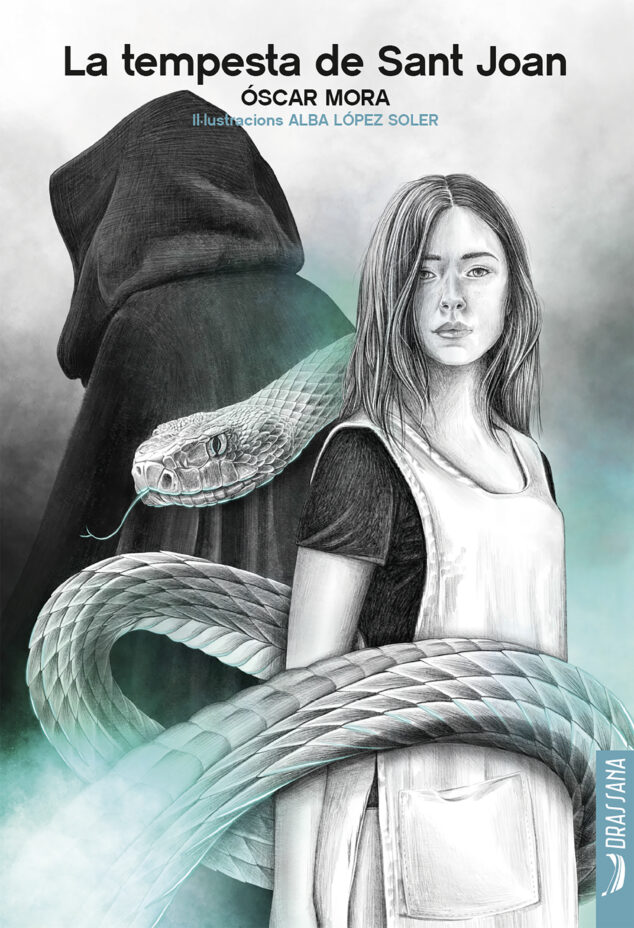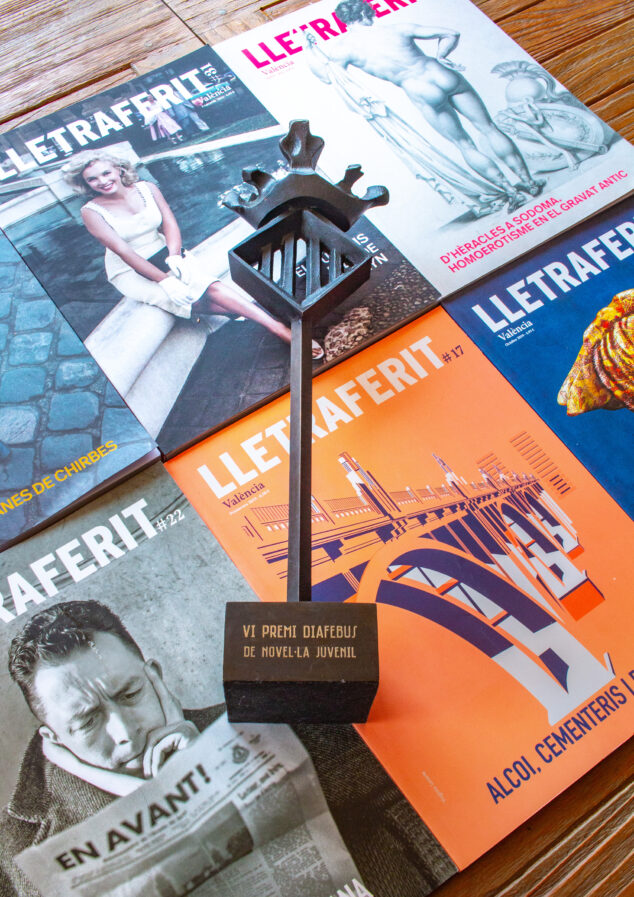Óscar Mora has always been close to storytelling, his thing is telling stories. He has had different jobs, from children's and youth literature advisor for several publishers, storyteller or television scriptwriter, his current job. However, it was in the years that he spent in Dénia as a bookseller that his first novel emerged, The storm of Sant Joan, winner of the 2023 Diafebus Youth Novel Award.
The storm of Sant Joan It is an adventure novel in which six young people arrive in Dénia to attend a music festival the days before the San Juans night. At the same time, a secret society formed by the town's fishermen is doing rituals to awaken a supernatural force that rests beneath the Montgo.
This Saturday the author will present his work at the Dénia Municipal Library at 12:00, but he wanted to reveal some secrets of his creation in this interview.
ASK. How long were you living in Dénia?
ANSWER. I came first one summer and stayed until October. She worked at the Ambra bookstore, until it closed. And then I returned the next two summers to work as a bookseller at Ex Libris, from June to September. Now I live in Valencia and return to Dénia every month and a half with the family.
Q. Do you think there is a need for references for novels that take place in Dénia?
R. I don't think so, many novels come out of Dénia. For example, we have Manuel Vicent, who has already shown the city in his novels several times or Rafael Chirbes with Crematorium.
Q. Do you think that the city of Dénia has potential as a location for adventure novels?
R. In the Marina Alta or in Dénia we do not normally see this type of narratives, we find them on digital platforms, and even in novels, the stories always occur in the United States and with fantastic beings... They are things that always happen to others and there is no reason why we cannot transfer all that imagery here.
When I considered writing this novel, I asked myself why I wasn't going to try to capture that particular essence that the Navy has, specifically Dénia, and tell an adventure story where the characters are not called Jimmy and Harry, but are Miquel, Vicent and Paula.
Q. Did the story emerge from the city or the other way around?
R. I thought about the plot at the beginning. I wanted to write an adventure novel that had a mystery and a small supernatural or fantastic element, but I couldn't find the space.
First I set it in Guardamar del Segura, which is a town that I also love very much, it is close to where I was born. On the other hand, he had started another novel when he lived in Dénia. Neither the youth story nor the other one completely convinced me.
Then I transferred the plot of the adventure novel to Dénia and it was indeed when everything began to fall into place, the story was filmed. For example, in a chase that occurs in the book, I said "this has to happen in the Les Roques neighborhood."
If you know the town well, you know that it has many faces. It is a place full of history. I make reference in the book, for example, to the Taifa of Dénia. It has been around for many years, one could count it since Roman times.
In fact, the novel is based on the poem by an American novelist, John Dos Passos, about dying in Dénia. I'm talking about the beginning of the 20th century.
And above all, another key aspect is that it is a place where there is a lot of intersection of people and different cultures and interesting things always come out of the mix and they are what I like to tell.
Q. What inspired you to write the novel?
R. There are two writers that I have as references. One is Terry Pratchett, he is an author who what he did was mix fantasy and humor as an excuse to talk about problems such as machismo or racism. I have tried to create slightly crazy characters like the ones he did. I have also relied on the writer Christopher Moore, an author who does satire.
Q. Do you think that the adventure genre is associated with youth novels and is there a certain modesty on the part of adults to read this type of stories?
R. Yes, the problem is what does and does not have, let's say, social prestige. Recently a list came out of a study of the ten books that people say they have read but it is a lie (like the El Quijote). That is, there is a certain type of posture.
There is a certain reservation that, if a novel is telling you an adventure, it is not that important and this is completely false because the most foundational texts, the first texts of literature, are all adventure novels.
The oldest narrative we have is an adventure novel, The Epic of Gilgamesh, which is 3.000 years old. Then this The odyssey y The Iliad which are the texts from which Western culture is born and are two adventure stories: one talks about a war and the other about the journey of a person who wants to return home and cannot because he encounters a cyclops, a witch, a mermaid... Even El Quijote It is a book of jokes and adventures.
What happens is the typical "guilty reading." You just have to look at the cinema: the films that are most successful now are superheroes, adventure films. We are all interested in stories that we would like to live or that we would like to have lived.
Q. What places in Dénia appear in the novel?
R. Places like Les Roques, the castle, Cova Tallada… I lived in Dénia in summer, which is quite different from winter, it was a hive of people. I ran it from top to bottom. I lived in Baix la Mar, which appears in the book, it has a lot of charm.
For example, a place that appears in the story that I didn't know about was the English Cemetery, which is not a real cemetery. It's the only place in the novel that I haven't had to change and make a little different from how it really is.
Q. Did you have to study the history of the city to write the novel?
R. If you spend a lot of time in a place, the best thing you can do is get to know it, either through the life that exists in the same location and what has happened there (its history). During the time I was living in Dénia, I was doing a little research on the construction of the castle, for example, or the independence of the Baix la Mar neighborhood. I was researching how the city was configured. It is a unique place.
Q. Have you been inspired by any inhabitants of Dénia for the story?
R. Well yes, working as a bookseller really means working in front of the public, and I was inspired by many people who passed by the bookstore, many young boys who came and also by the people there that I have met.
There is only one character who is 100% real, a friend of mine. When I was writing it didn't occur to me how I was supposed to be the rock star's assistant manager; so I gave it his name, my friend's last name and personality. The rest are mixtures of people I have met or have confabulated with.
Q. Has it been difficult for you to go from “screenwriter mode” to “writer mode”?
R. Not at all. I now work as a screenwriter, but my jobs - since I started working - have always had to do with telling stories. In addition, I am a storyteller for children and adults, I am also a text editor... The raw material with which I have worked in 90% of the cases is telling stories.
Being a screenwriter, I have been told that the text I create is very audiovisual, that is, it is created with images. I try to make everything visual and easy to imagine without describing it. And when you read the book, you can see that there are hardly any adjectives, descriptions or character traits. I think it is the best way for everyone to imagine things the way they want, although I am more demanding with the places, because they are real.
Q. How long did it take you to write the novel?
R. In terms of writing, about three months only. The whole project, about a year. I started writing where I didn't belong, I stopped... I had drafts but I didn't finish practically any story.
When I discovered this literary award, I set a date and it was when the deadline was three months away.
Q. Do you think the people of Dénia will appreciate the book more because it takes place in the city? Have you shown the book to any neighbors? What was the response?
R. I imagine so. Some people who have read it have told me that the city is very well portrayed, and it is also described in a positive way. My hope is that people see themselves reflected in that line that I portray, that they like it and take it as a reference.
In fact, other people from other places - like Valencia - who have read the book, what they have told me is that they really want to go to Dénia to see the places in the novel. Let's see if the City Council puts up a route throughout the city with the book in every corner (laughs).
Q. How does it feel to win the VI Diafebus prize for young people's novels with your first novel?
R. It is truly an honor, luck and a privilege. I knew the publisher that convened it, I know how they work, so the fact that this text is chosen because it has a very high standard of quality flatters me.
It is a pride above all to have the opportunity to enter the catalog of this publishing house, which is a reference for literature in Valencian.
Q. How would you describe the novel?
R. It is the adventure that we would all like to have lived when we were young and, if you are young, the one you would like to live.
Q. What would you tell readers to get them to read it?
R. Well, it's not very long, you're going to have a really fun time and, if you don't like the text, Alba López's illustrations are exceptional.
Q. Do you have any other novels in mind?
R. I have several, I can't stop writing. Now we're going to wait and see how this goes, to see if I continue down this path or publish something different.










Denia, it must be because it is a port surrounded by the Mediterranean that inspires with its magic, simply charming ☺️